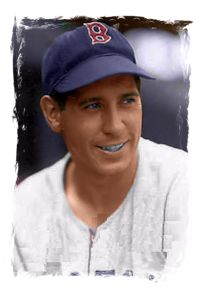 |
Sam Dente was born on April 25, 1922 in Harrison, New Jersey. He excelled at two sports as he grew up. He was a fine centre-half for the Kearny High School soccer team and was so good that after high school, he played professionally in the American Soccer League for the Kearny Americans. But Sam also shined at baseball. He played shortstop for Kearny High and, in 1941, was a finalist in the Most Valuable Baseball Player contest for high-school players from New York. In 1941 the Tigers offered him a bonus for signing and sent him to Newark and Jersey City, where he worked out with the Tigersí International League team, the Buffalo Bisons. The Tigers werenít interested in keeping him so the Red Sox jumped in and sent him off to the Owensboro Oilers of the Kentucky-Illinois-Tennessee League. The Red Sox saw enough potential that they moved him to Greensboro in 1942. In Scranton he again struggled with the bat, but World War II soon intervened. In June, he enlisted in the Army at Wilkes-Barre, Pennsylvania. Unlike many other major and minor leaguers, Sam didnít play baseball during the war. He was sent to Europe, where he manned an antiaircraft gun for much of the war that affected his hearing. Sam managed to make it to training camp after his discharge, and was placed back with Scranton for the 1946 season. After the season ended, the Red Sox swapped seven players to Louisville for seven players slated to be with Louisville in 1947. Sam signed a contract to play for the Red Sox, but not before the Red Sox told him in no uncertain terms to quit professional soccer. When the Red Sox broke camp and started barnstorming home, Sam was left behind at their camp in Sarasota. Eventually, the Red Sox sent him to Louisville for the start of their season, where he caught fire almost immediatelye. In July 1947, He was called up, but by seasonís end, was hitting only .232. The Red Sox, who finished third in the American League, were looking to upgrade at several positions so in November, they traded Sam to the St. Louis Browns. While he didnít crack the regular lineup at the start of the season, he still helped the Browns to a surprising winning record as June began. Sam had a good season as a spot starter for regular shortstop. But the Browns, always in the mood to trade a player especially when they received cash in return, traded him to the Washington Senators in October. When the 1949 season started, Sam was the Senatorsí starting shortstop. It was his best season as a major leaguer. While he had a good season with the bat, it wasnít as good defensively and led the league in errors. When the 1950 season began, he was the Senatorsí starting second baseman, but at the end of May, he moved back to shortstop. He struggled with the bat throughout 1950 and going into the 1951 season, he would have to earn his position. Toward the end of spring training, he started hitting again and entered the season with optimism. But his hitting woes continued through the beginning of the season. By June, Sam was hitting a paltry .218 and went to the bench for much of the rest of the season. In November he was traded to the White Sox. The White Sox brought Sam to spring training in Pasadena, California. and he stuck with the White Sox, winning a utility infielder position. He finished the season with a .221 batting average, easily his worst hitting season in the major leagues. After the season Sam worked at the Brooklyn Division of the American Baseball Academy, which was a baseball program aimed at juvenile delinquents. In 1953 he again made the Opening Day roster as a utility fielder and played in two games before the White Sox sold him to the Indianapolis Indians, a Cleveland Indians affiliate, in May. When he reported to spring training in 1954, he found he was in competition for two utility infielder spots. In August, Sam fractured his finger yet kept playing. He sat the bench for most of the World Series against the New York Giants. Sam entered the 1955 regular season again as one of the Indiansí backup infielders. By June his batting average stood at .210 in 40 games. After that, he played little, getting into 33 games the rest of the season. In October, he was sold to the Indianapolis Indians. His hearing problems from his time in the Army, became so bad that he underwent an ear operation but the operation left him with vertigo. In February 1956, the San Diego Padres of the Pacific Coast League purchased the rights to Sam. But in March, still plagued by issues following his ear operation, he announced his retirement. He subsequently had one more operation to correct his progressive deafness. Out of baseball, Sam become a salesman for various companies through the 1950s and 1960s and worked for a construction firm. In his spare time, he participated in baseball clinics. In the late 1960s he began working at Merit Mailers, a direct-mailing house in Newark, where he became a vice president. Sam Dente passed away on April 21, 2002 in Mountainside Hospital in Montclair, New Jersey at the age of 79. |
|||||
